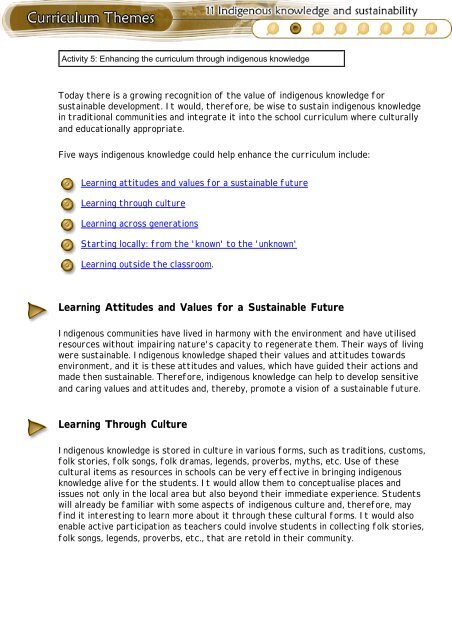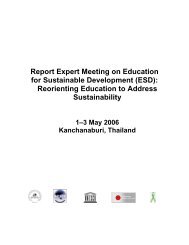Module 11 | Indigenous knowledge and sustainability - APCEIU
Module 11 | Indigenous knowledge and sustainability - APCEIU
Module 11 | Indigenous knowledge and sustainability - APCEIU
You also want an ePaper? Increase the reach of your titles
YUMPU automatically turns print PDFs into web optimized ePapers that Google loves.
Today there is a growing recognition of the value of indigenous <strong>knowledge</strong> for<br />
sustainable development. It would, therefore, be wise to sustain indigenous <strong>knowledge</strong><br />
in traditional communities <strong>and</strong> integrate it into the school curriculum where culturally<br />
<strong>and</strong> educationally appropriate.<br />
Five ways indigenous <strong>knowledge</strong> could help enhance the curriculum include:<br />
Learning attitudes <strong>and</strong> values for a sustainable future<br />
Learning through culture<br />
Learning across generations<br />
Starting locally: from the 'known' to the 'unknown'<br />
Learning outside the classroom.<br />
Learning Attitudes <strong>and</strong> Values for a Sustainable Future<br />
<strong>Indigenous</strong> communities have lived in harmony with the environment <strong>and</strong> have utilised<br />
resources without impairing nature's capacity to regenerate them. Their ways of living<br />
were sustainable. <strong>Indigenous</strong> <strong>knowledge</strong> shaped their values <strong>and</strong> attitudes towards<br />
environment, <strong>and</strong> it is these attitudes <strong>and</strong> values, which have guided their actions <strong>and</strong><br />
made then sustainable. Therefore, indigenous <strong>knowledge</strong> can help to develop sensitive<br />
<strong>and</strong> caring values <strong>and</strong> attitudes <strong>and</strong>, thereby, promote a vision of a sustainable future.<br />
Learning Through Culture<br />
<strong>Indigenous</strong> <strong>knowledge</strong> is stored in culture in various forms, such as traditions, customs,<br />
folk stories, folk songs, folk dramas, legends, proverbs, myths, etc. Use of these<br />
cultural items as resources in schools can be very effective in bringing indigenous<br />
<strong>knowledge</strong> alive for the students. It would allow them to conceptualise places <strong>and</strong><br />
issues not only in the local area but also beyond their immediate experience. Students<br />
will already be familiar with some aspects of indigenous culture <strong>and</strong>, therefore, may<br />
find it interesting to learn more about it through these cultural forms. It would also<br />
enable active participation as teachers could involve students in collecting folk stories,<br />
folk songs, legends, proverbs, etc., that are retold in their community.








